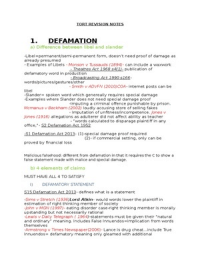Other
Tort Exam Revision notes
- Module
- Tort Law
- Institution
- Queen Mary, University Of London (QMUL)
Defamation Nuisance Duty - Breach - Causation - Remoteness - Defences Pure Psychiatric Injury Pure Economic Loss Occupier Liability Employer Liability Public Authority Liability
[Show more]



